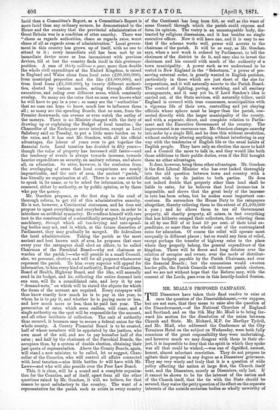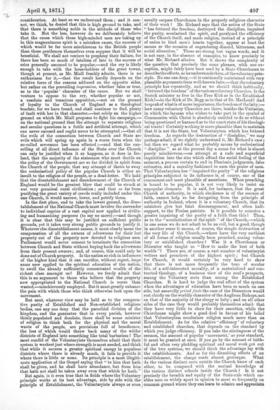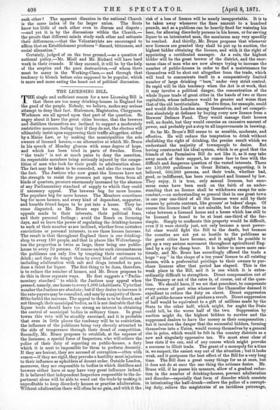MR. MIA TN,'S PROPOSED CAMPAIGN.
Trill Dissenters have taken their final resolve to raise at once the question of the Disestablishment,—we suppose,. but are not sure, that they mean to raise also the question of the Disendowment,—of the National Churches of England: and Scotland, and on the 9th May Mr. Miall is to bring for- ward his motion for the dissolution of the union between. Church and State. Mr. Richard, M.P. for Merthyr Tydvil, and Mr. Miall, who addressed the Conference at the City- Terminus Hotel on the subject on Wednesday, were both fully- conscious of the great responsibility they were undertaking, and however much we may disagree with them in their ob- ject, it is impossible to deny that the spirit in which they spoke- was all that could be wished,—was one of dignified, earnest, honest, almost reluctant conviction. They do not propose to. agitate their proposal in any degree as a Dissenters' grievance_ Theysay very wisely and truly that it is a question of wide- policy affecting the nation at large first, the Church itself- next, and the Dissenters, merely as Dissenters, only last. If it cannot be shown to be for the interest of the nation and, of the Church itself, that the tie with the State should be- severed, they waive the petty question of its effect on the separate interests of the outside sectarian bodies as wholly unworthy of consideration. At least so we understand them ; and it can- not, we think, be denied that this is high ground to take, and that there is something noble in the attitude of those who take it. Not the less, however do we deliberately believe that the cause which these high-minded men are taking up in this magnanimous spirit is a mistaken cause, the success of which would be far more mischievous to the British people than these gentlemen themselves even suppose that it will be beneficial. We shall not venture to prophesy their failure, for there has been so much of fatalism of late in the success of cries generally assumed to be popular,—and the cry is likely enough to take with the householders of the great towns, though at present, as Mr. Miall frankly admits, there is no enthusiasm for it,—that the result hardly depends on the relative force of the reasons adduced on the opposite sides, but rather on the prevailing impression, whether false or true, as to the 'popular' character of the cause. But we shall venture to oppose to the cry, whether popular or not, a resolute and tenacious opposition,—not on the ground of loyalty to the Church of England as a theological teacher, for we have found, and shall continue to find, plenty of fault with her in that character,—but solely on the higher ground on which Mr. Miall proposes to fight his campaign,— on the national ground that the attempt to separate religious and secular questions is a futile and artificial attempt, which can never succeed and ought never to be attempted ;—that all the evils of the connection between .Church and State are evils which will spring up again in a worse form when the so-called severance has been effected ;—and that the can- celling of all direct influence of the State over the Church can only be justified when it so happens, as it does in Ire- land, that the majority of the statesmen who must decide on the policy of the Government are so far divided in spirit from the Church of the people, that any attempt of theirs to sway the ecclesiastical policy of the popular Church is either an insult to the religion of the people, or a dead-letter. We hold that the disestablishment and disendowment of the Church of England would be the greatest blow that could be struck at our very germinal rural civilization ; and that so far from purifying the great variety of creeds really included under this one Church, it would narrow, lower, and petrify them.
In the first place, and to take the lowest ground, the dises- tablishment of the National Church must involve the surrender to individual caprice of a vast capital now applied to civiliz- ing and humanizing purposes (to say no more) ;—and though it is clear that this may be justified on sufficient public grounds, yet it takes very strong public grounds to justify it. Whatever else disestablishment means, it must clearly mean the compensation of all the owners of advowsons for their lost property out of the property now devoted to religious uses. Parliament would never consent to terminate the connection between Church and State without buying back the advowsons from their present owners ; and, of course, this could only be done out of Church property. Is the nation so rich in influences of the higher kind that it can sacrifice, without regret, large sums now applied to the spiritual education of the nation, to swell the already sufficiently concentrated wealth of the richest class amongst us? However, we freely admit that this is no argument to those who believe that the property now appropriated to the National Church is worse than wasted,—raischievously employed. But it must greatly enhance the pain with which those who think otherwise look upon the movement.
But next, whatever view may be held as to the compara- tive purity of Established and Non-established religious bodies, can any one deny that the parochial division of the kingdom, and the guarantee that in every parish, however thinly populated and desolate, there shall be some minister of religion to think both for the physical and the moral wants of the people, are provisions full of beneficence, the loss of which would throw back many of the wilder districts of England into something like total barbarism ? The most candid of the Voluntaryists themselves admit that their system is weakest just where strength is most needed, and think that while it secures a greater spiritual energy in populous districts where there is already much, it fails to provide it where there is little or none. Its principle is a most illegiti- mate application of the Gospel saying that " to him that hath shall be given, and he shall have abundance, bat from him that hath not shall be taken away even that which he hath."
Bat again, is it even true that in fields where the Voluntary principle works at its best advantage, side by side with the principle of Establishment, the Voluntaryists always or even
usually surpass Churchmen in the properly religious character of their work ? Mr. Richard says that the action of the State " has fettered the freedom, destroyed the discipline, impaired the purity, secularized the spirit, and paralyzed the efficiency of the Church itself, and made religion, instead of a principle of union to bind men's hearts together, appear at least the means or the occasion of engendering discord, bitterness, and social alienation." These are strong but vague words, and it is not easy, in the absence of examples, to know precisely to what Mr. Richard alludes. But it shows the complexity of the question that precisely the same phrases, with one ex- ception, might fairly have been used by a State Churchman to describe the effects, as he understands them, of the voluntary prin- ciple. No one can deny,—it is continually maintained with very plausible arguments from well-known faets,—that the voluntary principle has repeatedly, and as we should think habitually, "fettered the freedom" of thevarious voluntary Churches. Is the Scotch minister so free in the Free Kirk as in the Established Kirk?—in the Kirk of Dr. Begg as in that of Dr. MacLeod? And to speak of what is of more importance, the freedom of the laity ;--. how many voluntary Churches are there, besides the Unitarian, in which the layman who wishes to take part in the symbol of Communion with Christ is absolutely entitled to do so without being questioned or harassed as to the exact state of his theologi- cal tenets? Certainly nothing is more plausible than to maintain that it is not the State, but Voluntaryism which has fettered freedom. As regards the destruction of " discipline," we may perhaps admit, if we rightly understand it, Mr. Richard's case ; but then we regard what he probably means by ecclesiastical " discipline " as at the present day a name for what is almost purely mischievous,—an attempt at a rude and superficial inquisition into the sins which offend the social feeling of the moment, a process certain to end in Pharisaic judgments, false estimates, and a morality fashioned to earn the praise of men. That Voluntaryism has " impaired the purity " of the religious principles subjected to its influence is, of course, one of the commonest and most plausible of assertions. When preaching is bound to be popular, it is not very likely to insist on unpopular elements. It is said, for instance, that the great Church of authority, in which obedience is of the essence of faith, cannot help so far derogating from the principle of authority in Ireland, where it is a voluntary Church, that its ministers give but faint discouragement, and often half- support, to the Fenian patriots. Is it possible to conceive a greater impairing of the purity of a faith than this ? Then, as to the "secularization of the spirit " of the Church,—which in one sense we do not admit to be an evil, but a good, though in another sense it means, of course, the simple destruction of the very life of the Church,—where have the very earthiest of all forms of religion usually been preached, among volun- tary or established churches ? Was it a Churchman or Dissenter who taught us " How to make the best of both worlds "? There are, of course, a vast number of voluntaryist writers and preachers of the highest spirit ; but Church for Church, it would certainly be very hard to show that there is not more frequently the tone of secular life, of a self-interested morality, of a materialized and con- tracted theology, of a business view of the soul's prospects, among the Voluntary sects than among the Established Churches. It is hard to judge the real effect of the system when the advantages of education have been so much on one side, but assuredly primd facie the case of the Dissenters would rest chiefly on the worldly character of the Anglican Bishops, not on that of the majority of the clergy or laity ; and on all other sides of the case they would probably themselves admit that they have very little to show for their assertion, while the Churchman might show a good deal in favour of his belief that Voluntaryism secularizes religion much more than an Establishment. As for the relative efficiency' of voluntary and established churches, that depends on the standard by which you judge efficiency. If you take the stirringness of the sermon, the amount of popular movement,' as your standard, it must be granted at once. If you go by the amount of faith- ful and often very plodding spiritual and moral work got out of the two systems, we should think the advantage lay with the establishments. And as for the disuniting effects of an establishment, the charge reads almost grotesque. What do the various distinct sects outside the Church know of each other, to be compared with the mutual knowledge of the various distinct schools inside the Church I Is it not precisely the breadth and equity of the State-rule which en- ables men so widely apart in opinion to meet so frequently on common ground where they can learn to admire and appreciate
each other? The apparent disunion in the national Church is the mere index of its far larger union. The Sects know too little of each other even to discuss and dispute ; —and yet it is by the discussions within the Church,— the proofs that different minds study each other and estimate their differences,—that the Voluntaryists are encouraged to affirm that an Establishment produces " discord, bitterness, and social alienation."
Certainly, judged of on the true ground,—as a question of national policy,—Mr. Miall and Mr. Richard will have hard work in their crusade. If they succeed, it will be by the help of the sceptics and the pure destructives,—of whom there must be many in the Working-Class,— and through that tendency to blench before cries supposed to be popular, which is more and more eating the heart out of political discussion.




































 Previous page
Previous page